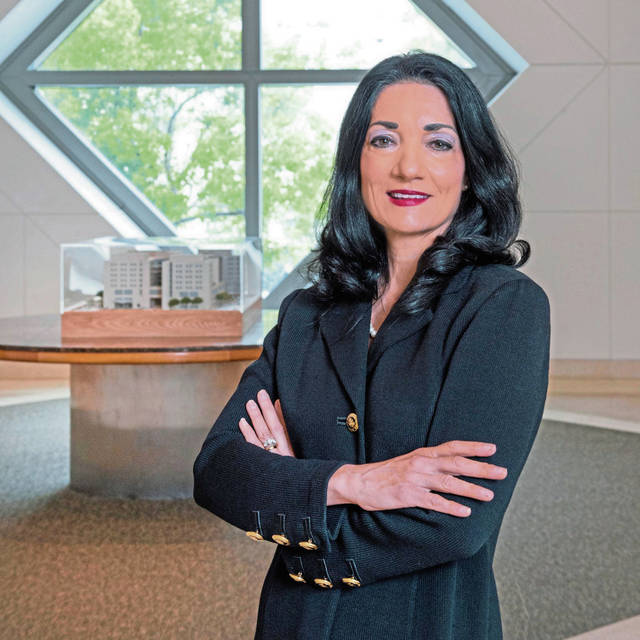https://mirror.triblive.com/local/westmoreland/mt-pleasant-native-leads-ucla-battle-against-coronavirus/
Mt. Pleasant native leads UCLA battle against coronavirus

When the novel coronavirus came ashore on the West Coast two months ago, Johnese Spisso was confident UCLA Health was up for the challenge.
The Mt. Pleasant native is president of UCLA Health and CEO of UCLA Hospital System — one of the nation’s largest medical academic research centers and its health system. As such, she began overseeing preparations for the outbreak in early January — when many dismissed the pandemic as a Chinese problem.
As she watched the reports from China and conferred with public health experts, Spisso knew her team had to act.
Los Angeles County confirmed a case of covid-19 on Jan. 26. The sprawling UCLA Health system recorded its first case days later.
On the surface, it appears California benefited from early efforts on the front lines to contain and mitigate the spread of the virus.
As of Friday morning, two months after its first confirmed case, The New York Times reported that California has seen more than 4,000 cases and 80 deaths. In New York, which didn’t record its first case until March 1, officials have reported more than 45,000 cases.
“One of the things we did was we rapidly started looking at our surge capacity and training our staff,” said Spisso, noting that UCLA Health is an academic health system with a strong disaster preparedness infrastructure. “We’re used to responding to other disasters, be it earthquakes, be it major trauma. But in emerging infectious diseases, it’s a little more complicated.”
There was the issue of training staff in the proper use of personal protective gear, marshaling equipment and supplies, and preparing to test and treat an influx of patients with a highly contagious illness in the nation’s second-largest city.
Experts had to convince a skeptical public a threat that merited extreme measures was looming. UCLA stressed public service messages.
“Our message to the community was: ‘We as health care providers are coming in for you. We need you to stay in for us,’ ” Spisso said.
There was no question UCLA would be treating patients with covid-19. It had been designated to accept travelers returning from overseas at Los Angeles International Airport, or LAX.
UCLA set up tents outside the hospital so patients who suspected they may have contracted the virus could be screened there instead of in the emergency room. Today, Spisso said UCLA is treating, on average, 15 to 20 patients a day in its ICU and adult care units.
Meanwhile, UCLA also tapped telemedicine to minimize patients’ physical visits to hospitals and doctors’ offices.
Spisso said UCLA researchers were among the first in the nation to develop their own test for the virus. Recently, they expanded their capacity from 100 to 500 tests a day. She said that likely will boost the number of positive test results in Southern California, a region where numbers have been relatively low.
Western Pa. roots
Spisso began her health care career four decades ago as a nurse in the critical care and trauma units of then-Presbyterian University Hospital in Pittsburgh. That experience influenced her approach to health care in many ways, ranging from patient care to staff considerations.
Growing up in Mt. Pleasant, a small town in Westmoreland County, provided what she called the “best education in the world” for tackling tough problems.
“The way people respect and help each other … the work ethic in those communities is like no other,” she said. “My parents were amazing in their professions, in the careers they had and what they did for the community. As young children, they always taught us how important it was to engage with the community, to give back to the community.”
There has been a lot of that at UCLA these days.
Spisso said when UCLA realized what it might be asking of its staff during the outbreak, her team reached out seeking housing, meals and child care for frontline health care workers who would be asked to save lives under trying conditions.
Local foundations stepped up to provide meals, while nearby hotels provided housing for exhausted workers who were hesitant to return home after a day of working with virus patients. Health system employees who weren’t needed in clinical settings and retired nurses stepped up to provide child care.
“The frontline staffers in a pandemic are so important to us,” Spisso said. “We know there is a lot of fear in this pandemic, so we want to do the little things we can do to make a difference.”
In California, it helped that local corporations helped to fill the gap in supplies and equipment.
“We’re burning through a lot of more supplies than we typically would,” Spisso said. “We had a warehouse of supplies to begin with.”
Costs are escalating.
“We really need (government) funding for support, because hospitals are at a point right now where we’re exceeding our budget ability to maintain,” she said.
Meanwhile, researchers at UCLA are collaborating with scientists at the FDA and other major research centers racing to create a vaccine and effective treatments.
“We are actively in one of the clinical trials for one of the treatments,” Spisso said. “We’re actively studying that.”
Her team is watching developments across the country, anticipating UCLA will see covid-19 peak in Los Angeles in about three weeks.
Asked if there’s any advice she’d like to share, Spisso said the best thing people everywhere can do is shelter in place, practice social distancing and wash their hands often.
“Looking at what has happened in other countries, we know what works and what doesn’t work,” she said.
Copyright ©2026— Trib Total Media, LLC (TribLIVE.com)
